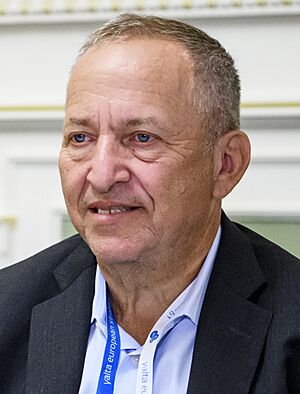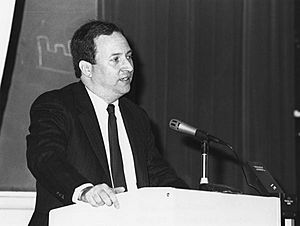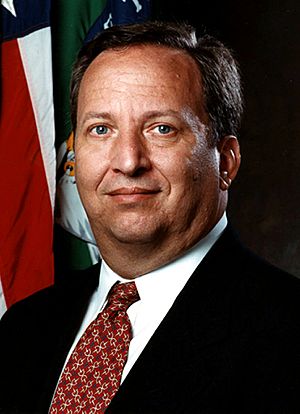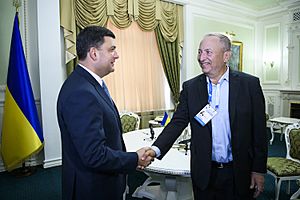Lawrence Summers facts for kids
Quick facts for kids
Lawrence Summers
|
|
|---|---|

Summers in 2018
|
|
| 8th Director of the National Economic Council | |
| In office January 20, 2009 – January 20, 2011 |
|
| President | Barack Obama |
| Deputy | Diana Farrell Jason Furman |
| Preceded by | Keith Hennessey |
| Succeeded by | Gene Sperling |
| 27th President of Harvard University | |
| In office July 1, 2001 – June 30, 2006 |
|
| Preceded by | Neil Rudenstine |
| Succeeded by | Derek Bok |
| 71st United States Secretary of the Treasury | |
| In office July 2, 1999 – January 20, 2001 |
|
| President | Bill Clinton |
| Deputy | Stuart E. Eizenstat |
| Preceded by | Robert Rubin |
| Succeeded by | Paul H. O'Neill |
| 7th United States Deputy Secretary of the Treasury | |
| In office August 11, 1995 – July 2, 1999 |
|
| President | Bill Clinton |
| Preceded by | Frank N. Newman |
| Succeeded by | Stuart E. Eizenstat |
| Under Secretary of the Treasury for International Affairs | |
| In office April 5, 1993 – August 11, 1995 |
|
| President | Bill Clinton |
| Preceded by | David Mulford |
| Succeeded by | Jeffrey R. Shafer |
| Chief Economist of the World Bank | |
| In office January 14, 1991 – January 14, 1993 |
|
| President | Barber Conable Lewis Thompson Preston |
| Preceded by | Stanley Fischer |
| Succeeded by | Michael Bruno |
| Personal details | |
| Born |
Lawrence Henry Summers
November 30, 1954 New Haven, Connecticut, U.S. |
| Political party | Democratic |
| Spouses |
Victoria Perry
(m. 1984; div. 2003)Elisa New
(m. 2005) |
| Children | 3 |
| Education | Massachusetts Institute of Technology (BS) Harvard University (MA, PhD) |
| Signature | |
| Academic career | |
| Institution | Harvard University London School of Economics |
| Field | Macroeconomics |
| School or tradition |
New Keynesian economics |
| Doctoral advisor |
Martin Feldstein |
| Doctoral students |
Alan Krueger, Kiminori Matsuyama, James R. Hines Jr., Rhee Chang-yong |
| Awards | John Bates Clark Medal (1993) |
| Information at IDEAS / RePEc | |
Lawrence Henry Summers (born November 30, 1954) is an American economist. An economist studies how people and countries make choices about money and resources. Summers has held many important jobs in the U.S. government and at Harvard University. He was the Secretary of the Treasury from 1999 to 2001. He also led the National Economic Council from 2009 to 2010. This group advises the U.S. President on economic issues.
Summers was also the president of Harvard University from 2001 to 2006. Today, he is a professor at Harvard. In November 2023, he joined the board of directors for OpenAI, a company that works on artificial general intelligence.
Before these roles, Summers was a professor at Harvard. He also worked as the Chief Economist of the World Bank from 1991 to 1993. The World Bank helps developing countries. Later, he joined President Bill Clinton's team at the United States Department of the Treasury. He helped the U.S. respond to money problems in countries like Mexico and Russia. He also worked on making financial rules simpler in the U.S.
After his time at Harvard, Summers worked for a company called D. E. Shaw & Co.. He then returned to public service during the Obama administration. He helped President Barack Obama deal with the Great Recession, a big economic downturn.
Contents
- Early Life and Education
- Career Highlights
- Personal Life
- Images for kids
- See also
Early Life and Education
Lawrence Summers was born in New Haven, Connecticut, on November 30, 1954. His parents, Robert Summers and Anita Summers, were both economists and professors. He is also related to two Nobel Prize winners in economics, Paul Samuelson and Kenneth Arrow. He grew up in Penn Valley, near Philadelphia.
At age 16, he started college at Massachusetts Institute of Technology (MIT). He first planned to study physics but soon changed to economics. He graduated in 1975. He was also a strong debater at MIT. He then went to Harvard University for his advanced degrees, earning his Ph.D. in 1982. In 1983, when he was just 28, Summers became one of the youngest professors to get a permanent teaching position at Harvard.
Career Highlights
Academic Economist Role
As a researcher, Summers has made important contributions to many areas of economics. These include how governments manage money (public finance) and how people earn and spend money (macroeconomics). He also studied how people work (labor economics) and how financial markets operate.
In 1993, he received the John Bates Clark Medal. This award is given to an American economist under 40 who has made major contributions. He also won the Alan T. Waterman Award in 1987. This award recognizes outstanding young scientists. Summers is also a member of the National Academy of Sciences. Today, he teaches popular courses at Harvard University.
Public Service Roles
Summers worked as an economic adviser for President Reagan in 1982–1983. He also advised Michael Dukakis during his presidential campaign in 1988.
Chief Economist at the World Bank
From 1991 to 1993, Summers worked as the Chief Economist for the World Bank. This organization helps developing countries grow their economies.
At the World Bank, Summers helped create plans to support developing nations. He also worked on the bank's loan decisions and guided its research. The World Bank noted that his research showed how important it is to invest in educating girls in developing countries. The Economist magazine described Summers as someone who often sparked debates about economic policy.
Service in the Clinton Administration
In 1993, Summers joined the United States Department of the Treasury under President Bill Clinton. He first served as Undersecretary for International Affairs. In 1995, he became Deputy Secretary of the Treasury. Then, in 1999, he became the Secretary of the Treasury.
During his time at the Treasury Department, Summers focused on global economic issues. He helped the Clinton administration assist Mexico and Russia during their financial crises. He also encouraged Russia to adopt policies like privatization, which means selling government-owned businesses to private companies.
Summers also supported the Gramm–Leach–Bliley Act in 1999. This law changed rules that had separated different types of financial services since the Great Depression. Summers believed this law would help American companies compete better. Some critics later suggested that changes like these contributed to the subprime mortgage crisis in 2008.
Views on Financial Rules
In 1998, Summers stated that large financial institutions could protect themselves from risks. He said there was no clear need for more rules on certain financial products. However, after the 2008 financial crisis, Summers changed his view. He quoted John Maynard Keynes, saying, "When circumstances change, I change my opinion." He admitted that the lack of regulation on some financial activities was "outrageous."
President of Harvard University
In 2001, Lawrence Summers became the 27th president of Harvard University. He served in this role until June 2006. He was the first Jewish president of Harvard.
Discussions on Gender Differences
In January 2005, Summers gave a speech about why there might be fewer women in top science and engineering jobs. He suggested a few possible reasons. One idea he mentioned was that there might be differences in how abilities are spread out between men and women. He also talked about how society and unfair treatment might play a role.
This speech caused a lot of discussion and criticism. Summers apologized several times for his remarks. This controversy was one reason he decided to step down as Harvard's president the next year.
Support and Opposition at Harvard
On March 15, 2005, some Harvard professors voted that they had "lack of confidence" in Summers's leadership. However, the university's main governing body, the Harvard Corporation, strongly supported him.
Some professors, like Steven Pinker, defended Summers's right to discuss his ideas. A student poll by The Harvard Crimson newspaper showed that most students did not want him to resign.
Resignation from Harvard
On February 21, 2006, Summers announced he would leave his position as president on June 30, 2006. Harvard provided him with a paid break from work and helped with a loan. Derek Bok, a former Harvard president, became the interim president.
Post-Harvard Presidency Career

After leaving Harvard, Summers returned to teaching as a professor. He also joined the board of directors for several companies. These included D. E. Shaw & Co., a hedge fund, and Square, a company that develops electronic payment services. He also advised Andreessen Horowitz, a venture capital firm.
National Economic Council Role
In January 2009, President Barack Obama appointed Summers to lead the National Economic Council. In this role, Summers was a key decision-maker in the Obama administration's response to the Great Recession.
Summers faced both praise and criticism in this role. Some, like Peter Orszag, called him "one of the world's most brilliant economists." However, some members of Congress and economists like Paul Krugman disagreed with his ideas for economic recovery. Summers supported tax cuts as part of the stimulus plan, while others wanted more spending on things like roads and bridges.
Later Career and Views
After leaving the National Economic Council in December 2010, Summers continued to advise financial companies. He also rejoined Harvard as a professor.
In 2013, Summers was considered a top candidate to lead the Federal Reserve, the central bank of the United States. However, he withdrew his name from consideration. He felt that the process would be too difficult and not helpful for the country.
Summers has also shared his opinions on major global events. He called the United Kingdom's decision to leave the European Union (Brexit) in 2016 a "self-inflicted policy wound." He also warned about the economic risks of Donald Trump's election as president in 2016.
Personal Life
Lawrence Summers was diagnosed with Hodgkin's lymphoma, a type of cancer, around 1983. He received treatment and has been cancer-free since then.
He has three children, Ruth, Pamela, and Harry, from his first marriage to Victoria Joanne Perry. In December 2005, Summers married Elisa New, an English professor. She has three daughters from a previous marriage. Summers lives in Brookline, Massachusetts.
Images for kids
See also
 In Spanish: Lawrence Summers para niños
In Spanish: Lawrence Summers para niños
 | Delilah Pierce |
 | Gordon Parks |
 | Augusta Savage |
 | Charles Ethan Porter |




